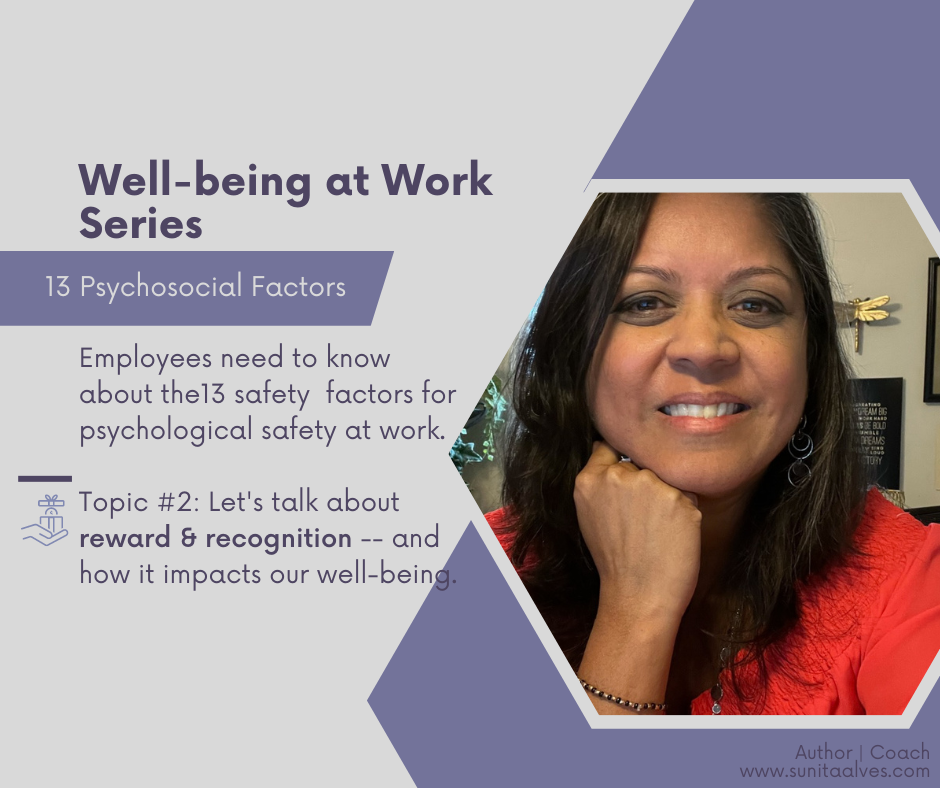Did you know there are 13 different ways to assess if the workplace harms employees psychologically, such as stress, depression, and anxiety? I started this series to share these 13 factors.
The first, organizational culture, was discussed in this post on LinkedIn and on blog post.

The second installment of the series focuses on how reward and recognition impact well-being.
On March 8, 2023, International Women’s Day, I made this video post to honour a dear colleague – “Rosie” (not her real name) – who was not recognized in the workplace. It caused her great distress and put undue worry on her mind about her job security.
Whenever I start working with a new team, I try to connect with people in a human and caring way. One of the questions I tend to ask is for them to tell me what risks they see. I think I build trust this way because I listen. In return, some colleagues will share personal, not just project, challenges.
I’ll see that some team members feel under-recognized or passed over in some other way. I feel for them deeply because I can see it causes pain. In some cases, I think it can impact mental health.
I will always carry the worry that I didn’t do enough to help Rosie. She was a gem of a person and did not deserve her well-being to be so impacted by being excluded from recognition events or made to feel “less than.”
The Canadian Centre for Occupational Health and safety says:
“Lack of recognition and reward undermines employee confidence in their work and trust in the organization. Employees may feel demoralized or they may quit. An imbalance between effort and reward is a significant contributor to burnout and emotional distress leading to a range of psychological and physical disorders.”
I know Rosie was in emotional distress. I knew her confidence was undermined.
I know that when I was given a year-end review calling me “a profound disappointment,” it was horrible, but then my clients took me out for drinks to celebrate my contributions. They saw I was not being recognized by my own employer – in fact, I was actively criticized. But they knew I was a valuable team member, and they arranged a celebration party for me between them. In addition to a great outing to Pravda Vodka Bar, they made a gift for me that is at my desk to this day. They framed a story about teamwork, and each person signed it.
It was their comments of gratitude on this gift that helped me feel good about myself.
When rewards and recognitions are given out at work, it can be done in a way that excludes people.
I’ve seen it so many times. And each person will take it differently – some may have it roll off their back. Some may have their sense of well-being undermined.
It’s this latter group that I worry about. I’m not sure if they feel they have options. How can you expect a workplace to change its decision once made? Leaders don’t typically like to make mistakes. Logistically, it can be hard to change once the budget cycle is set and decisions are recorded by HR.
The question becomes, how can someone who feels passed over / not seen for their worth, feel worthy?
Many of us are compassionate leaders in the workplace and empathetic people. We have the ability to discern if there is someone who needs help in this area. It starts with building trust, establishing mindful listening, and truly “seeing” them. This is important for the team members we care about and for ourselves (our families want us to be healthy, too.)
One tip I can give you is to practice loving-kindness meditation.
This meditation brings you into the present moment, away from the mental constructs of the past and future. In this space of “true reality,” or “dharma,” as it is called, we can tend to our feelings and accept them with compassion – meaning without needing to fix them.
We see it’s a difficult situation and sit with it. After a few minutes, you may be surprised that your outlook has shifted. Perhaps you have clarity on what is within your power to do. Perhaps you feel a sense of calm, ease or inner peace that wasn’t there before.
⭐ Please take good care of yourself. And, if you have resilience, take good care of your colleagues.
⭐ Have a conversation – just talking about it and bringing compassion and light is important.
There is a reason The Standard lists this recognition and reward factor as one of the biggest ones correlated to how employees feel safe. And we all care about business results, too. Psychological safety and team success have been linked together.
⭐ So it’s a complete win-win if reward and recognition are done right at work.
⭐ And if it isn’t — don’t be a bystander. If all you can do is say, “Hey, I see what’s happening, and it really sucks. I’m so sorry. I recognize you.” Then do that.
💗 It makes a difference when communicated with compassion, mindfulness, and kindness.
